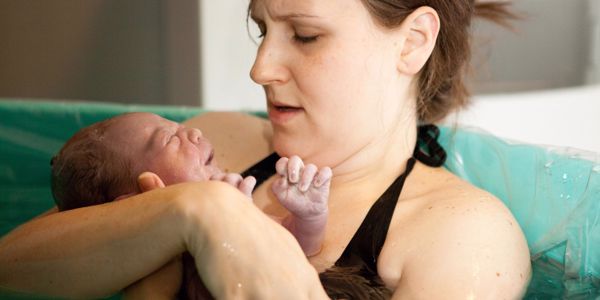When you are still in your first or second trimester, you may have started to think about how you’d like to give birth and already have your hospital/birthing unit chosen and scheduled in. Although hospital births are the most common, there are other options available and giving birth in a hospital doesn’t mean that you must be in a bed either.
Here’s our guide to the most popular types of birth to help you with your choice.
Hospital Births
According to the ONS (2019), 34% of British women gave birth in a hospital unit. Obviously, the main benefit of giving birth in a hospital, is that you have a lot of staff around you, particularly specialist consultants, to support you at every step. You’ll also have access to all the pain relief options with an anaesthesiologist on-site.
Birth Centres
A birth centre is another popular choice that combines some of the medical requirements you may need or want, with a more home-comfort feel. In the same ONS study, 63% of women gave birth in midwife-led units/birth centres. They are less ‘medical’ than a hospital but do offer a certain level of care. They are NHS run, usually led by midwives and support staff, and can offer birthing pools, complementary therapies, and sometimes even family accommodation, making your birthing experience a little more comfortable. Talk to your midwife about whether this option is available to you. Often, high-risk pregnancies need a little extra care on a maternity ward in hospital. Birth centres are also not available everywhere, so you may need to travel a distance to your nearest one. Bear this in mind when you are booking yourself in and make sure that your travel options are available from 36-weeks. A birth centre will not be able to offer a full range of pain relief, or any special assistance with the birth (such as caesareans or assisted delivery). If you do require further medical attention, you would be transferred to the hospital by ambulance. Some birthing centres are located next to hospitals, whereas some will require a little drive. According to hospital stats, you will likely receive more 1 to 1 care in a birth centre than in a hospital, which can be useful after birth, for aspects such as breastfeeding initiation.
Home Births
Home births have become more and more popular and are often the first choice for women in their second pregnancy. Home births are suitable for women who have a low-risk pregnancy and no complications expected during childbirth. As with any labour, midwives will monitor your baby and progress throughout, and if they feel concerned at any time, they may ask you to transfer to a hospital via ambulance - so keep a bag packed just in case. Also, something to note, is that no pain relief will be available at home, other than gas and air, as well as pethidine.
Having a planned home birth does not need to be difficult, but you will need to make sure you are prepared, and well in advance of your due date. You may also want to hire or buy a TENS machine for some at-home pain relief. The room you choose to give birth in will need to be big enough for you, the birthing pool (if you’re using one), your midwife, and your birthing partner to move around in. It should be a suitable temperature, not too warm or too cold. It’s ideal to cover the floor with a rubber mat or old sheets but remember that sheets will not fully protect a carpet underneath. You’ll also need easy access to a tap to fill up the pool, and no, you can’t use your bath as a pool!
Water Births
Water births are much less stressful for your baby when they are born, as they are being born into a similar environment to the amniotic fluid in your womb. For you, it can reduce the need for pain relief and be a more relaxing experience than in a hospital room. Calming music on, lights dimmed, and the relaxing feeling of being in the warm water makes water births extremely popular these days. Your partner can either assist from outside the pool or get in there with you - if your hospital or birthing unit allows. Many birth centres have pools available for each room, and some hospitals also have these facilities. It is worth noting that pain relief options are limited when using a pool too. Water births are often not advised for high-risk pregnancies or those that will require intervention, but you still may be able to go in the pool before you've reached active labour.
Hypnobirthing
The premise of hypnobirthing is that you will be calmer and less stressed by using hypnosis during your labour and birth. It uses language to refer to the stages of birth, to invoke a more positive attitude about what is to come. Hypnobirthing is supported in all birth settings. Midwives claim that using the techniques can give a shorter length of first stage labour, a reduction in the intensity of pain felt and less fear and anxiety felt after birth.
The techniques include suitable labour and birth positions, methods for self-hypnosis, and deep relaxation and breathing techniques for labour. It can be helpful to involve your birthing partner in your hypnobirthing preparations so that they can act as a prompt for you if needed, to keep you focused and calm. Hypnobirthing is often recommended for women who have previously had a traumatic birth experience or are extremely anxious about their first labour and birth.
Other Things to Consider
It may be possible for you to choose a water birth, or to use hypnobirthing to assist your birth. These are available at several hospitals and birth centres, although they cannot guarantee they'll be available for us if there is a high demand for these services when you arrive.






